Summary: This isn’t a report like I would usually give about our outreach; it’s a confession. I take you inside my struggle with showing up and staying present in Tent City. And then let’s walk together, visually, into areas I rarely visit.
Read Time: Approximately 12 minutes.
I still remember the drive out to Tent City to meet the newspaper editor.
The truth is, I was hoping something would go wrong. That God would shut the door. That I’d be spared—from exposure, from responsibility, from the part of me that still wants to be needed. Or seen.
But the door stayed open. The story ran.
And now I was standing in the middle of nowhere with a man and a woman, two long-time Tent City residents, well-known and well-respected. They’d come to talk to me. About what I’d written. About the article. If it felt like betrayal, this could go sideways fast. To be honest with you, I felt very vulnerable. I had no backup. No witnesses. Just me, standing in the middle of a sacred place that wasn’t mine to expose.
I had prayed before ever publishing a word. And I begged when the opportunity presented itself with the media.
Please, God, don’t let me do this if it’s not Your will—especially if I’m doing it from the wrong place in me.
But they didn’t come to scold me. They came to thank me.
They said it mattered to have someone step into their world, to try to show it truthfully and respectfully to people who would never come close enough to see for themselves. We talked for a while. The man told me he was treated better in prison, respected. I got the impression that he experienced quite the opposite out in the world. We spent a lot of time talking, and they shared some pretty deep stuff.
Needless to say, I was relieved. It seems to me that it is confirmation that it was God’s will all along. And my jaw intact? Double blessing.
But that wasn’t the reason I came. You see, it’s been my personal experience that when God wants me to do something, He will be gently persistent in getting my attention. And believe me, it was made very clear that I was to go fishing with the residents who live here. And honestly, I really didn’t want to go. Hence the persistence. So, I made a deal with myself that I would show up, and if nobody wanted to participate, it meant that I had permission to leave.
I’d brought a dozen fishing poles and tackle with plans to meet up with a resident I’ve known for a long time. We’d talked about going fishing on several occasions. When I got to camp, he was leaving—but promised that next time, he’d drop whatever he was doing and go with me. It was the easy way out, and I took it.
We loaded the gear into his sister’s car. I trusted him to distribute it fairly. As the car pulled away, I felt the tension fade. Off the hook, I thought. So, I walk around to the back of the truck to get into the driver’s door and notice that I have several gallons of water in the back. I can’t just leave without at least taking two one-gallon containers to the easiest-to-reach point. Besides, I figured now that I had gotten out of going fishing, I could make one more trip through the rugged terrain and be okay for the day. So, I did, and a young man and woman followed me back, pulling their wagon. The rock is so coarse that it easily consumes the wheels of the wagon, adding to the difficulty. I can’t imagine what it’s going to be like on their way back when it’s loaded with several pounds of water.
That’s when the fishing gear came back—literally. The car returned, and suddenly, five people were gathered, rods and reels in hand, sorting through equipment just as I had known they would. So much for being off the hook. I followed them back in, thinking maybe we’d all go fishing together after all. The young man was dragging his loaded wagon. Another walked his bicycle behind me at a distance, I suppose, which made him feel safe.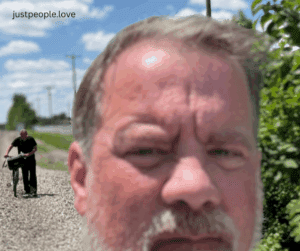
Every time I visit, I notice the scattered leftovers. I recognize a lot of it because we brought it down here. Tents torn from the wind, food spoiled and left to rot, blankets tangled in brush. It used to frustrate me. Now I see it differently. I wish I knew how to put this into words. I suppose I’m not quite there yet. But the parameters in their world are different than ours. I think many of us look at this and create a label to attach to the location, pretending that it identifies who they are as a human being. I’ve heard terms used in social media such as “trash heap”, “dump”, “filthy encampment”, to mention a few. And believe me, they read that. And it hurts.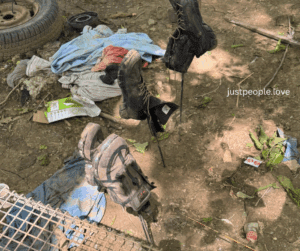
Back in camp, everyone went their separate ways to prepare. I stayed with the man I’d planned to fish with. We were preparing our gear outside his home. Or he was. I mostly stood there, pretending to know what I was doing. I haven’t fished in thirty years, maybe more. The equipment didn’t look like what my dad and I used. And yet, I started to feel something—a flicker of encouragement. I imagined us all casting lines together. Talking. Laughing. Maybe, if I caught something, I could hand it off to someone else. I wasn’t even sure I remembered how to dress a fish.
Then he asked me to go deeper into Tent City and tell the others it was time. That everyone was going fishing.
The place he wanted me to go to wasn’t easy to reach. The terrain turns steep fast, and after a good rain, you’d better be on your hands and knees or you’ll fall and likely get hurt. I had wanted to talk with him about my mobility issues—about needing to be honest if we were going to spend time together. But I didn’t want to disappoint him. I’d worked too hard to earn his trust. So, I went.
There were probably seven people at this camp. And one of them was a young woman who had never fished before and was determined to do so. The others didn’t show much interest, so, against my better judgment, I let her come with me. But I made sure that she remained about fifteen yards ahead of me on the trail. This is not the situation that I want to be in.
We returned to the meeting spot, but no one was there. She headed off down another trail, waist-high grass parting in front of her. She is insistent on going fishing. And she’s not going to stop at anything until she finds the others wanting to fish. I know where she’s headed, but I don’t think that she does. And I’m beginning to question her mental stability. The trail ahead looked soft, blanketed in mulch and shadow—but that’s a lie. It’s splintered bark, sharp plastic, glass, and half-rooted debris. Every step is a gamble. You’re not just going for a stroll here.
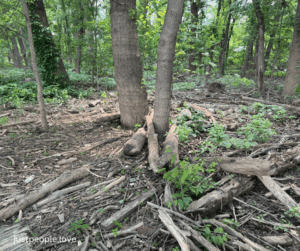
And that’s when it hit me. The canopy of vegetation had changed everything. A few weeks ago, you could see everything—camps, people, paths. Now? You can’t even see your own feet. The overgrowth disorients me. Slows me down. Forces humility. I can’t barrel through anymore. I have to be more aware of my surroundings, which isn’t one of my strong points. But for those who live here, it’s a gift. A shield. Privacy. A rare layer of safety from judgmental eyes, city sweeps, and intrusion. It also means that in just a few weeks, it will be tall enough that I will no longer be able to see specific tents that are far off the path. Or the people who live there. Not being able to see is a little unnerving.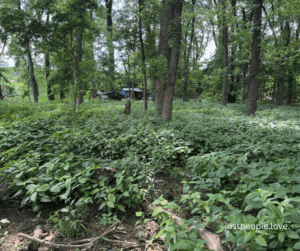
I trailed behind her far enough that her red dyed hair was just a dot on the horizon, hoping she’d tire out and turn back. Then I could return to my truck and still say I’d tried. Still say I showed up. We’re pretty far in at this point. I’ve only been in this part of Tent City a handful of times. There is a stream here with a piece of wood spanning the two sides. It bends as you cross it, making you wonder if this is going to be the time that it decides it’s done with your weight. The water that runs underneath is certainly not clean.
Still off the hook.
But then I saw him again—the man I came to fish with—walking toward me with his girlfriend. He lit up when he saw me. And I was very glad to see him. I followed them across the precariously placed board, and we went in a direction that I had not been before.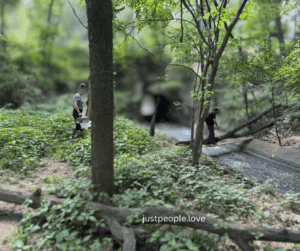
The trail opened into a quiet clearing with a stunning view. The kind of view that folks in town pay a fortune for. It smelled like nature should. It sounded like peace.
And then we were fishing. We didn’t talk. We just shared space. I stood still, unsure why I’d made it so hard. Why would God choose me, the least likely person to want to do this, to experience something this beautiful? I don’t feel like I deserve it. But that would insinuate that there was some way for me to earn it. And because of what Jesus did on the cross, that’s just not possible. I can’t earn it, that’s grace. If you’re not a person of faith, it’s okay. I question my faith several times every day. But we can work together for the same cause.
Many other notable events occurred in May. We collaborated with Owensboro Christian Church and visited what was formerly known as Rolling Heights Subdivision (now called Churchill Park), where we easily fed three hundred people. And later in the month, on Saturday, May 31, we visited our usual stops, which include the Cadillac Motel and Tent City. We distributed a large amount of food, hygiene supplies, and essential items, some of which were particularly helpful to people who had just arrived at Tent City. This would include tents, sleeping bags and mats, duct tape, tarps, toiletries (including body wipes), batteries, lighters, and, if available, a flashlight, can opener, and bug spray. We easily fed another three hundred people on that day, which conservatively added up to six hundred for the month. None of which would have been possible if it weren’t for folks like you, who were led to bring all this to us so that we could share it with others. And for that, I’m very thankful.
All of the real names used here were with permission. Otherwise, the names have been changed. To protect the identity of those photographed, they have been blurred intentionally unless consent was given before publishing.
The Safer Kentucky Act, which went into effect on July 15, 2024, makes sleeping or camping in public areas illegal, including on sidewalks, roadsides, under bridges, or in parks, parking lots, garages, or doorways. The law creates a new offense called “unlawful camping” that can result in arrest and fines. Assisting those individuals is considered to be aiding and abetting, which is a legal doctrine that refers to the act of helping or encouraging someone to commit a crime. The person who aids and abets is generally held to the same degree of criminal liability as the person who commits the crime. We ask that you please not attempt to locate or visit Tent City.
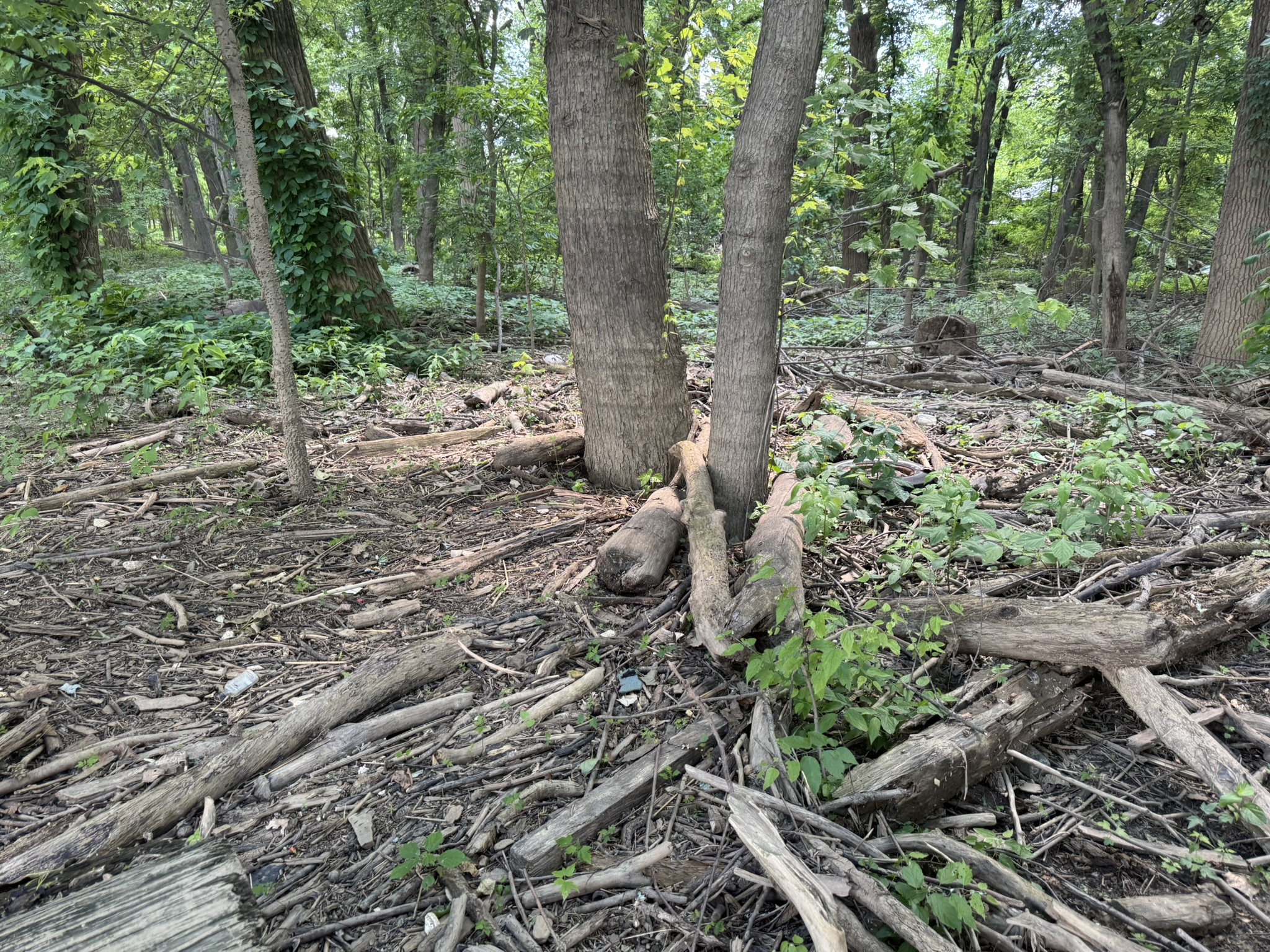
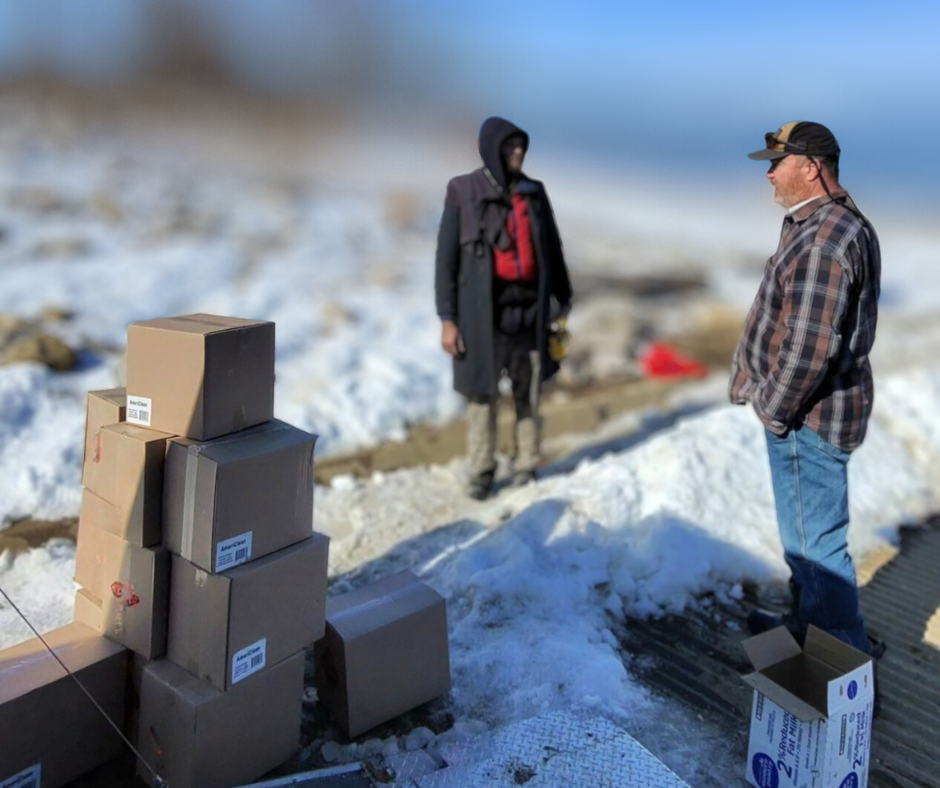
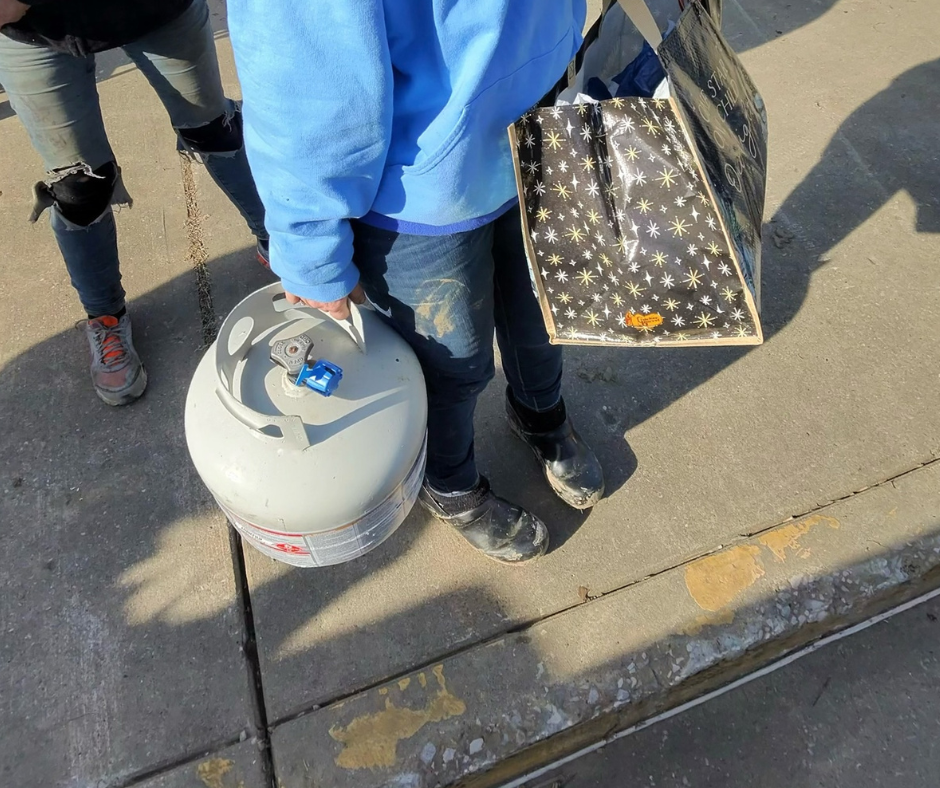
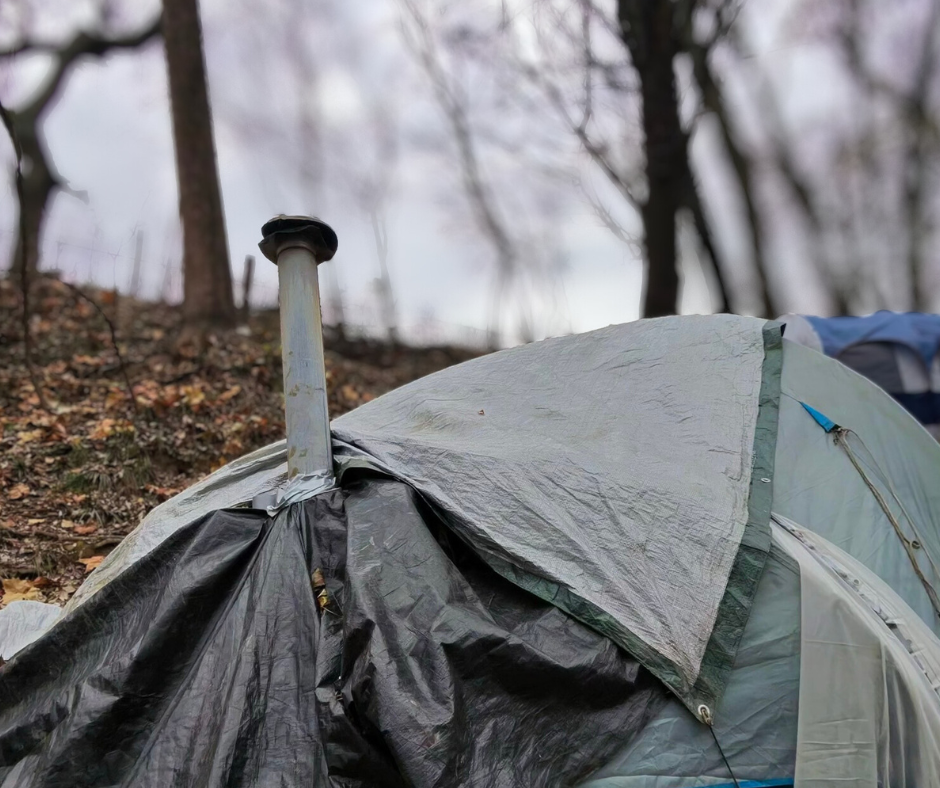
Thanks for sharing your experiences. Makes my bad days not as bad as I thought.
Thanks be to God i
Good read.
God bless each one of you at Just People for getting out of your comfort zone and loving on these homeless people. People don’t wake up one day and just decide to be homeless. They are someone’s mother, father, brother sister or child. We ALL are worthy of Gods love and His grace no matter what situation we are in. Thank you for caring for them each and every month!
God bless each one of you at Just People for getting out of your comfort zone and loving on these homeless people. People don’t wake up one day and just decide to be homeless. They are someone’s mother, father, brother sister or child. We ALL are worthy of Gods love and His grace no matter what situation we are in. Thank you for caring for them each and every month!